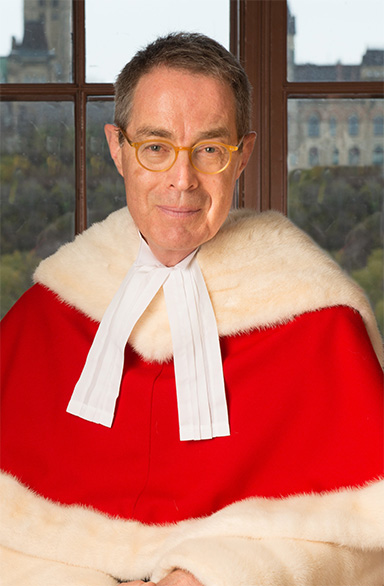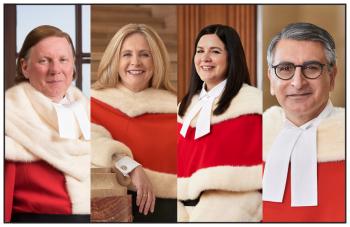Image Caption
with files from Shari Narine
Windspeaker.com
Today the Supreme Court of Canada decided the case known as Cindy Dickson v. Vuntut Gwitchin First Nation (VGFN), and while the First Nation can claim an ultimate victory, the decision comes with dissenting opinions on the appeal questions considered.
Cindy Dickson wanted to run for a position on VGFN council, but she came up against a requirement under the Vuntut Gwitchin’s constitution that she just couldn’t agree to.
The VGFN constitution provides certain rights and freedoms to its citizens, rules for the organization of its government, as well as electoral rules and standards. Among those rules is that elected chief and councillors reside on the settlement lands of the self-governing First Nation or relocate there within 14 days of the election.
That would have meant that Dickson, if successful in her bid to be elected to council, would have been required to move from her home in Whitehorse to live in Old Crow, Yukon, the seat of the VGFN government 800 km north. The most northern community in the Yukon, it is without all-season roads, and regularly accessible only by plane.
Dickson could not meet that residency requirement, she said. She has a son that needs medical care that cannot be met in the remote community. Dickson decided to challenge the residency requirement under sec. 15 of the Canadian Charter of Rights and Freedoms, that “every individual is equal before and under the law and has the right to the equal protection and equal benefit of the law without discrimination ….” Lower courts had rendered their opinions which went against Dickson for the most part, so on Feb. 7, 2023, the Supreme Court of Canada heard Dickson’s appeal.
The Vuntut Gwitchin First Nation had countered with a cross-appeal that pointed to section 32(1) of the Charter, which identifies which entities are bound by it, including federal and provincial legislatures and governments, as well as entities that are controlled by a government or that perform governmental functions.
The self-governing First Nation said it did not fit the section 32 (1) definitions, so the Charter did not apply to the residency rule.
And VGFN had a secondary argument. It asserted that the residency rule did not violate Dickson’s equality rights but, if it was determined that it did, then sec. 25 of the Charter provided VGFN a shield.
“Section 25 states that the guarantee in the Charter of certain rights and freedoms must not be interpreted so as to abrogate or derogate from any Aboriginal, treaty or other rights or freedoms that belong to the Aboriginal peoples of Canada,” reads a summary statement from the Supreme Court.
So, the Supreme Court needed to determine:
- whether the Charter applied to the VGFN residency rule in the first place. Yes, it does, the majority of justices decided. There was dissent on this, however.
- whether Dickson’s equality right was breached? Yes, it was breached.
- and if that equality right was breached, then did sec. 25 provide a shield to upholding Dickson’s right? Yes, it did. The majority opinion said the residency requirement is protected as an “other” right or freedom under sec. 25 of the Charter because it preserves “Indigenous difference”, reads the Supreme Court decision summary. And again there was dissent.

Justice Nicholas Kasirer and Justice Mahmud Jamal wrote the majority opinion. Concurring were Justices Richard Wagner, the chief justice, and Suzanne Côté.
The decision summary explains that the purpose of sec. 25 is to uphold certain collective rights and freedoms of Indigenous peoples when those collective rights conflict with an individual’s Charter rights. The majority declared that the residency requirement protects Indigenous difference, “understood as interests connected to Aboriginal cultural difference, Aboriginal prior occupancy, Aboriginal prior sovereignty, or Aboriginal participation in the treaty process.”
“Requiring VGFN leaders to reside on settlement land helps preserve the leaders’ connection to the land, which is deeply rooted in the VGFN’s distinctive culture and governance practices. It also bolsters the VGFN’s ability to resist the outside forces that pull citizens away from its settlement land […]. Such interests are associated with various aspects of Indigenous difference . . .,” reads the majority decision.
And while Dickson’s equality right was breached, that right did abrogate or derogate the “other” right held by VGFN under sec. 25, which resulted in an “irreconcilable conflict between the two. As such, pursuant to Section 25 of the Charter, her claim could not be given effect.”
The Dickson appeal on sec. 15 then was dismissed by the majority, the VGFN cross-appeal on sec. 32 was dismissed and the Charter applied, and the residency requirement of the VGFN upheld under sec. 25.
Justice Malcolm Rowe had a dissenting opinion, however, on the sec. 32 assertion by VGFN. He says VGFN’s enactment of the residency requirement in its constitution is not subject to the Charter and therefore sections 15 and 25 need not have been addressed.
He writes that the internal governance of Indigenous Nations does not fall within the scope of the Charter unless there exists a significant connection to either the federal or a provincial government. “While this connection may be present with band council structures imposed by the Indian Act, R.S.C. 1985, c. I-5, the same cannot be said for governance structures chosen by the Vuntut Gwitchin themselves…” under their self-government agreement.
The VGFN’s governance structures and internal decisions are rooted in the Vuntut Gwitchin’s own legal traditions and choices and do not attract Charter scrutiny under s. 32(1), he wrote.
And he wrote that imposing the Charter on the VGFN was not consistent with the objective of reconciliation and with the need to respect the ability and the right of the Vuntut Gwitchin to make decisions pursuant to their own laws, customs, and practices.
Further, Rowe wrote that VGFN never agreed to adopt the protections set out in the Charter. Rather, the VGFN had enacted its own protections for the rights of its citizens, many of which mirror the Charter but are adjusted to its people’s own laws, customs, and practices. The protections in the VGFN constitution include protections for equality rights. Ms. Dickson’s challenge to a provision of the VGFN constitution must be addressed pursuant to the VGFN’s own internal structures and processes, reads the dissent.
“I would therefore dismiss Ms. Dickson’s appeal and allow the VGFN’s cross-appeal, on the basis that the Charter does not apply to the VGFN’s enactment of the residency requirement,” Rowe wrote.
Justices Sheilah Martin and Michelle O’Bonsawin came to a different conclusion on sec. 25, and therefore a different decision on the case, saying the section doesn’t shield the self-governing First Nation from Charter challenges from its citizens.
To interpret the section as such a shield “would lead to the far-reaching result of creating and affirming Charter-free zones, with the consequence that minorities within Indigenous communities would not be protected from the actions of their own governments,” they wrote.
Martin and O’Bonsawin, who is the only Indigenous person on the top court, would still have applied the Charter to the VGFN residency rule, thereby dismissing the VGFN cross appeal under sec. 32. They would have found the residency rule in violation of Dickson’s sec. 15 equality right. They were not satisfied that the residency requirement fell within the scope of sec. 25.
“We conclude that Ms. Dickson’s s. 15(1) Charter claim must succeed. The residency requirement draws a discriminatory distinction between VGFN citizens that live on the settlement land and those that do not.”
The decision can be read here: Dickson v. Vuntut Gwitchin First Nation - SCC Cases (scc-csc.ca)

